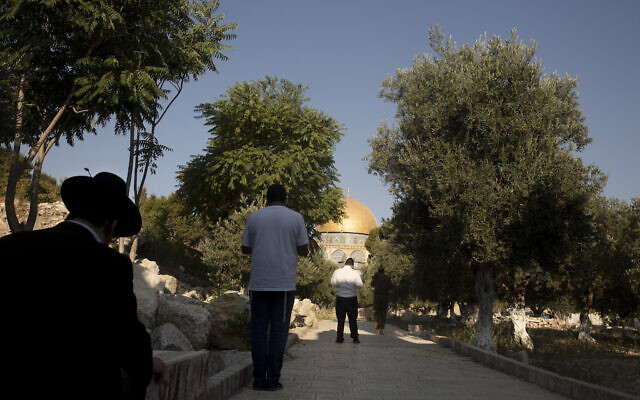
Court reinstates police ban on Jewish man who prayed on Temple Mount
Moves comes after US reaches out to Jerusalem on ruling denounced as violating arrangements barring non-Muslim worship at the flashpoint holy site
A Jerusalem judge on Friday upheld a police order barring a Jewish man caught praying on the Temple Mount, reversing a lower court’s decision backing the man’s quiet supplication that critics said could have led to widespread unrest.
Friday’s ruling by the Jerusalem District Court came after Police Minister Omer Barlev appealed a magistrate’s decision Tuesday in the case and warned that the ruling could spark violent protests, apparently under US pressure to uphold longstanding religious arrangements at the holy site. The police also appealed the lower court’s ruling, which was seen as tacitly approving Jewish prayer on the Temple Mount in a breach of decades of Israeli policy.
In the fresh ruling, District Court Judge Aryeh Romanov confirmed that Jews are barred from worshiping openly at the site, where only Muslims are currently permitted to pray.
The case revolved around a police decision to bar a Jewish man from the site for 15 days after he was seen praying quietly there. The Magistrate’s Court judge ruled that because the prayer was made quietly and not openly, it could not pose a security risk, which police use to justify enforcement of the ban.
But Romanov noted that the fact the defendant was caught served as proof that the prayer was overt.
“What is important… is the fact that there was someone who noticed the appellee praying, which evidently shows that the prayer was overt. If it was not overt, no one would have noticed it,” Romanov wrote.
Romanov also ruled the officer exercised proper discretion in removing the man from the site and that there were therefore no grounds for the earlier intervention by the Jerusalem Magistrate’s Court to lift the 15-day ban.
Concerning what constitutes praying openly, Romanov declined to weigh in on the matter. He also did not address whether the rules on prayer at the Temple Mount are too strict or if there was any room for flexibility in enforcing the ban.
Under understandings reached after Israel captured the Old City and East Jerusalem in the 1967 war, Jews are allowed to visit but not to pray there. Israel maintains overall security at the site, but the Muslim Waqf administers religious activities there. Police have for decades enforced the Jewish prayer ban as a public security measure.
The Temple Mount, known to Muslims as the Haram al-Sharif, is the holiest site for Jews and site of the third holiest shrine in Islam. It is the emotional epicenter of the Israeli-Palestinian conflict, and tensions there helped ignite the 11-day Gaza war in May.
In a statement earlier Friday, Barlev noted that he too had appealed the lower court decision, warning that “a change in the existing status quo will endanger public peace and could cause a flare-up.”
The statement was issued after officials from US President Joe Biden’s administration reached out to Jerusalem over the case, an Israeli official told The Times of Israel.
According to this source, the US officials were concerned that the magistrate’s court ruling could lead to an escalation in violence and urged the government to clarify its position on the matter.
The State Department did not respond to a request for comment.
“The State of Israel advocates freedom of worship and prayer for all, however, in view of the security implications, the status quo must be observed,” Barlev added.
The earlier court ruling had been narrowly focused on overturning the man’s ban from the plaza. Magistrate courts make up the lowest level of the Israeli judiciary and hear cases concerning relatively minor crimes.
Judge Bilhah Yahalom had noted that the man, “like many others, prays on a daily basis on the Temple Mount.”
“The appellant stood in the corner with a friend or two, there was no crowd around him, his prayer was quiet, whispered,” she noted.
“I have not found that the religious acts carried out by the appellant were externalized and visible,” she ruled, determining that such prayer did “not violate police instructions,” and canceling his ban from the site.

ערבי
ערבים
מוסלמי
מוסלמים
חג
תפילה
הר הבית
הפגנה
יהודים
החלטת
שופט
The Jordanian-run Islamic Waqf that oversees the Temple Mount called the magistrates court ruling a “flagrant violation” of the compound’s sanctity and a “clear provocation” for Muslims worldwide.
“This decision also has no legitimacy because we do not recognize Israeli law on Al-Aqsa,” mosque director Sheikh Omar al-Kiswani told AFP.
Minor changes to the status quo at the holy site or even rumors of such changes have sparked violent protests in the past. In 2017, a decision to place metal detectors and cameras at the compound following an attack there sparked several days of angry protests and condemnation from Israel’s Muslim neighbors.
Agencies contributed to this report.



















